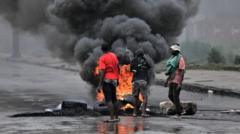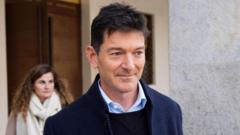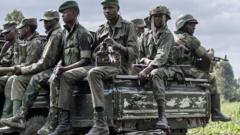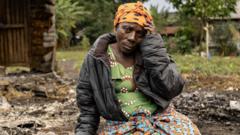Protests against Daniel Chapo's legitimacy escalate as he seeks to stabilize Mozambique's political landscape.
Mozambique Faces Turbulent Times as Daniel Chapo Assumes Presidency

Mozambique Faces Turbulent Times as Daniel Chapo Assumes Presidency
Nationwide strike threats loom over new president's swearing-in amid election disputes
In a tumultuous phase for Mozambique, President-elect Daniel Chapo is set to be inaugurated amidst significant controversy and public unrest. More than three months after a contentious election deemed fraudulent by opposition leaders and electoral observers, Chapo's entry into office has ignited protests that have rocked the nation. With Chapo securing 65% of the votes, many Mozambicans are vehemently contesting the legitimacy of the results, leading to violent clashes resulting in fatalities and extensive property damage.
Chapo's arrival as the new leader, taking the helm from outgoing President Felipe Nyusi, is overshadowed by protests organized by his chief adversary, Venâncio Mondlane. Returning from self-imposed exile after surviving an attempted assassination, Mondlane is calling for renewed demonstrations on inauguration day to rally against what he refers to as "the thieves of the people."
The two leading opposition parties, Renamo and MDM, announce their boycott of the inauguration ceremony, echoing sentiments of discontent within the nation. Even among those who view Chapo positively, skepticism about his legitimacy remains prevalent. Civil society advocate Mirna Chitsungo expresses her admiration for Chapo but emphasizes the troubling electoral backdrop under which he assumes power, stating, "He is taking power in a context where the people do not accept him."
As Chapo navigates his initial steps as president, he faces the daunting task of winning over a skeptical public keen on seeing tangible progress in economics and corruption eradication—issues he vowed to address during his campaign. Analysts caution, however, that he is entering a politically intricate climate where corruption remains entrenched, likening the challenges to battling a host of cartels that plague various sectors of society.
Chapo’s life story is one of resilience; born in a turbulent era shaped by civil conflict, his rise to prominence included roles in media, education, and provincial governance. Analysts describe him as a patient leader, keen on fostering dialogue. He intends to focus on national reconciliation, job creation, and reforming electoral laws, but questions arise regarding the viability of such aspirations without widespread public support.
Notably, Chapo will be Mozambique's first president unscathed by the struggles of independence, introducing a generational change to the leadership dynamics. While he must work to establish connections with Mondlane and address the broad grievances of the populace to secure his administration's success, foundational changes are necessary to challenge Mozambique's troublesome political heritage.
In the wake of escalating protests and public discontent, the route toward national recovery remains fraught with challenges. With his inauguration looming and many citizens feeling disenfranchised, Chapo faces not only the task of governance but also the imperative to bridge a deeply divided nation.
Chapo's arrival as the new leader, taking the helm from outgoing President Felipe Nyusi, is overshadowed by protests organized by his chief adversary, Venâncio Mondlane. Returning from self-imposed exile after surviving an attempted assassination, Mondlane is calling for renewed demonstrations on inauguration day to rally against what he refers to as "the thieves of the people."
The two leading opposition parties, Renamo and MDM, announce their boycott of the inauguration ceremony, echoing sentiments of discontent within the nation. Even among those who view Chapo positively, skepticism about his legitimacy remains prevalent. Civil society advocate Mirna Chitsungo expresses her admiration for Chapo but emphasizes the troubling electoral backdrop under which he assumes power, stating, "He is taking power in a context where the people do not accept him."
As Chapo navigates his initial steps as president, he faces the daunting task of winning over a skeptical public keen on seeing tangible progress in economics and corruption eradication—issues he vowed to address during his campaign. Analysts caution, however, that he is entering a politically intricate climate where corruption remains entrenched, likening the challenges to battling a host of cartels that plague various sectors of society.
Chapo’s life story is one of resilience; born in a turbulent era shaped by civil conflict, his rise to prominence included roles in media, education, and provincial governance. Analysts describe him as a patient leader, keen on fostering dialogue. He intends to focus on national reconciliation, job creation, and reforming electoral laws, but questions arise regarding the viability of such aspirations without widespread public support.
Notably, Chapo will be Mozambique's first president unscathed by the struggles of independence, introducing a generational change to the leadership dynamics. While he must work to establish connections with Mondlane and address the broad grievances of the populace to secure his administration's success, foundational changes are necessary to challenge Mozambique's troublesome political heritage.
In the wake of escalating protests and public discontent, the route toward national recovery remains fraught with challenges. With his inauguration looming and many citizens feeling disenfranchised, Chapo faces not only the task of governance but also the imperative to bridge a deeply divided nation.




















